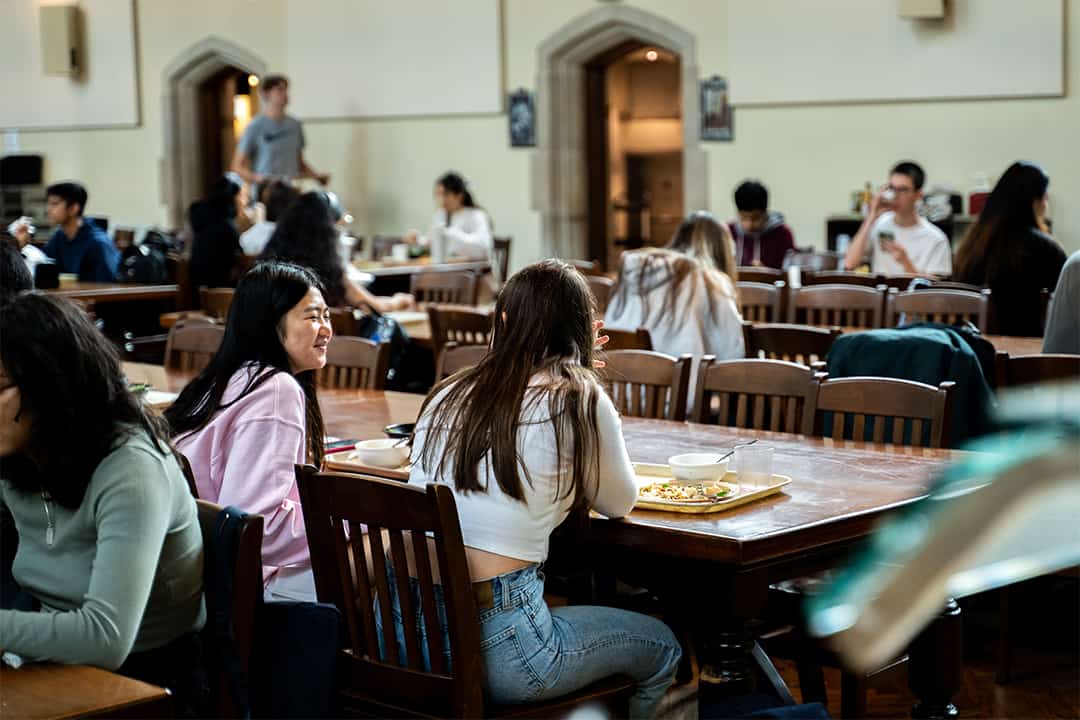Based on a 2022 Waste Audit commissioned by U of T, 12.7 per cent of the waste collected at UTSG consisted of food — an estimated total of 342.1 metric tonnes of food waste annually. Simultaneously, students and people across the city have been facing increasing rates of food insecurity brought on by rising food prices on and off campus, as highlighted in the University of Toronto Students’ Union’s (UTSU) Food Insecurity Report.
Cecilia Xie — a student at Victoria College — and a group of her friends noticed an abundance of leftovers at the Burwash Dining Hall and devised a program to donate this food to food banks across the city. In addition, these students are working with Professor Eva-Lynn Jagoe to establish a café called “Climate Café,” where they intend to give out free food to students.
Food donation plan
The Burwash Dining Hall provides Victoria College students three meals on weekdays, and two meals over the weekends. The staff at Burwash immediately discards the leftover food at the end of the day.
Xie told The Varsity that she and others previously worked on a program to use students’ surplus meal plan money to purchase produce to donate. However, this plan focused their efforts on the end of the academic year, so the project did little to save the amount of food that was wasted on a daily basis. Xie pivoted to implementing a system that uses excess food by donating it to various food banks.
As of November 2023, Xie and her colleagues are looking to launch their pilot program. They have reached out to and are working with Victoria University Students’’ Administrative Council, the dean’’s office, the campus group Student for Collective Resistance, and the dons at Victoria College.
The group submitted a grant application to the Air Travel Emission Mitigation Initiative (ATEMI) project, a U of T program where the university collects funds from a fee on its air travel and uses the money to support initiatives that reduce emissions. Although they are still waiting to hear back, the ATEMI website states that the Sustainability Office will announce ATEMI fund recipients in early 2024.
Climate Café
Professor Jagoe, a faculty member in the Spanish and Portuguese department and the Centre for Comparative Literature, leads the Climate Café initiative, which grew out of an undergraduate research project in summer 2023. The Climate Café program aims to provide free food to students in opposition to a “profit-oriented mindset toward food,” according to an email from Xie.
While the Food Donation Program and Climate Café have been in the making for a whole year, the team is still working on securing proper funding and collaborating with the Burwash Dining Hall staff and the university to divert dining hall food to both food banks and the Climate Café.
Seeing the larger picture
The UTSU Food Insecurity Report highlights problems faced by students due to rises in prices at New College and Chestnut Dining Halls. The report says, “As meal prices surge, students who cannot afford these increased costs may be forced to skip meals or reduce the quantity and quality of their food intake. This can have profound implications for their physical and mental health, as well as their academic performance.”
Food scarcity and food prices also impact those not living in residence. The City of Toronto website reports that 18.6 percent of Torontonians live in food-insecure households as of 2021.
Xie mentioned the urgency of implementing the two initiatives. “[The] clock’’s ticking, meals are being cooked every single day — and they dump things out every single meal,” she said.


